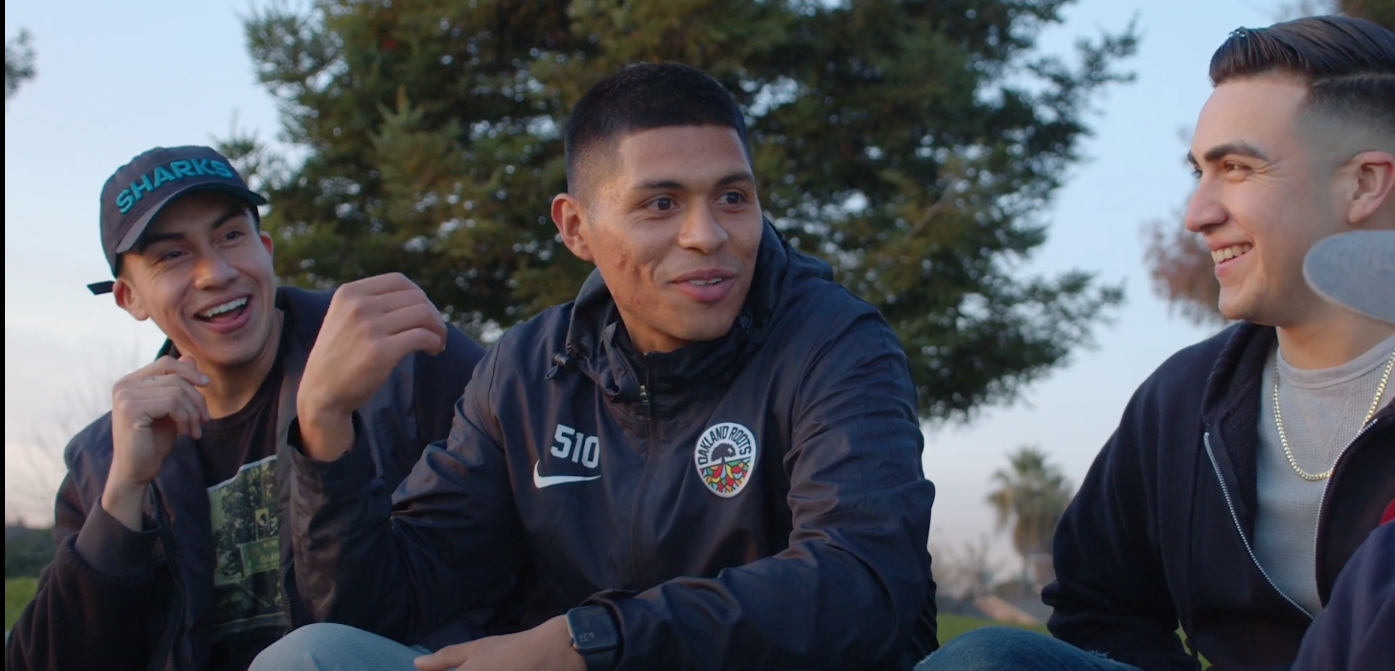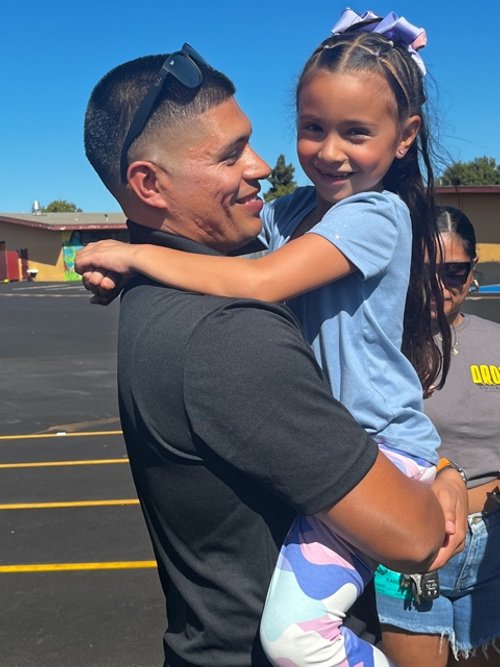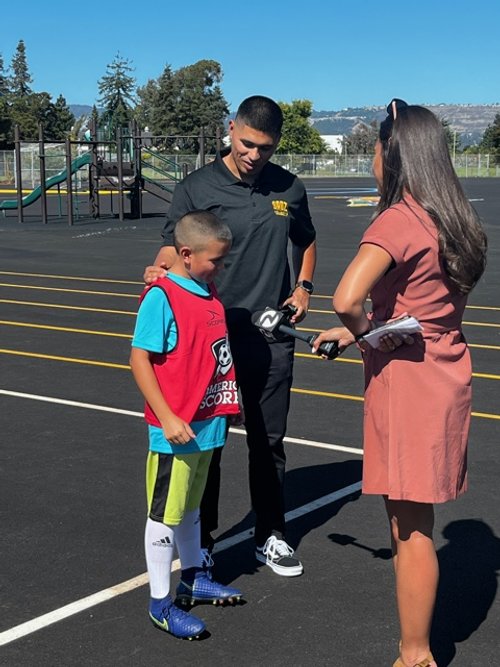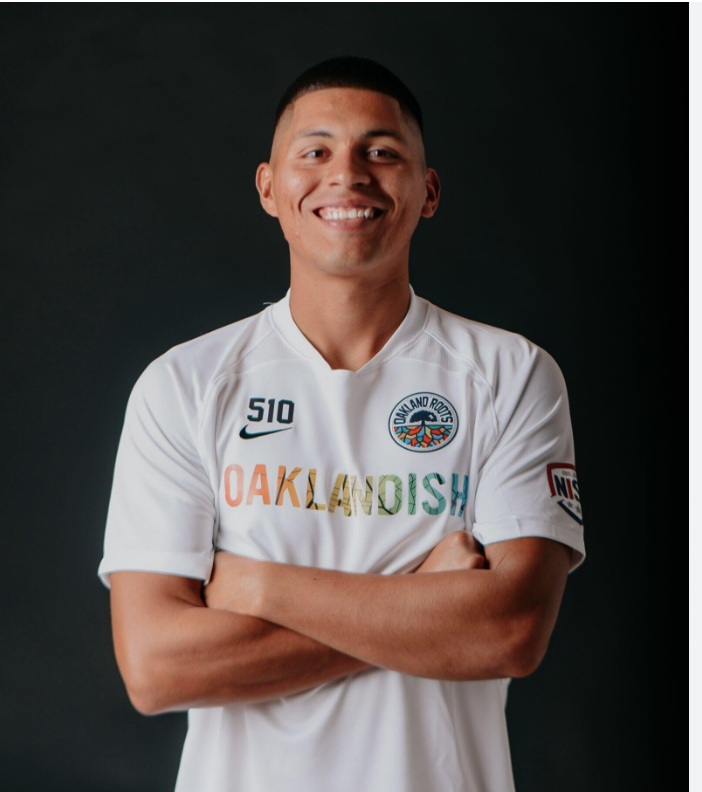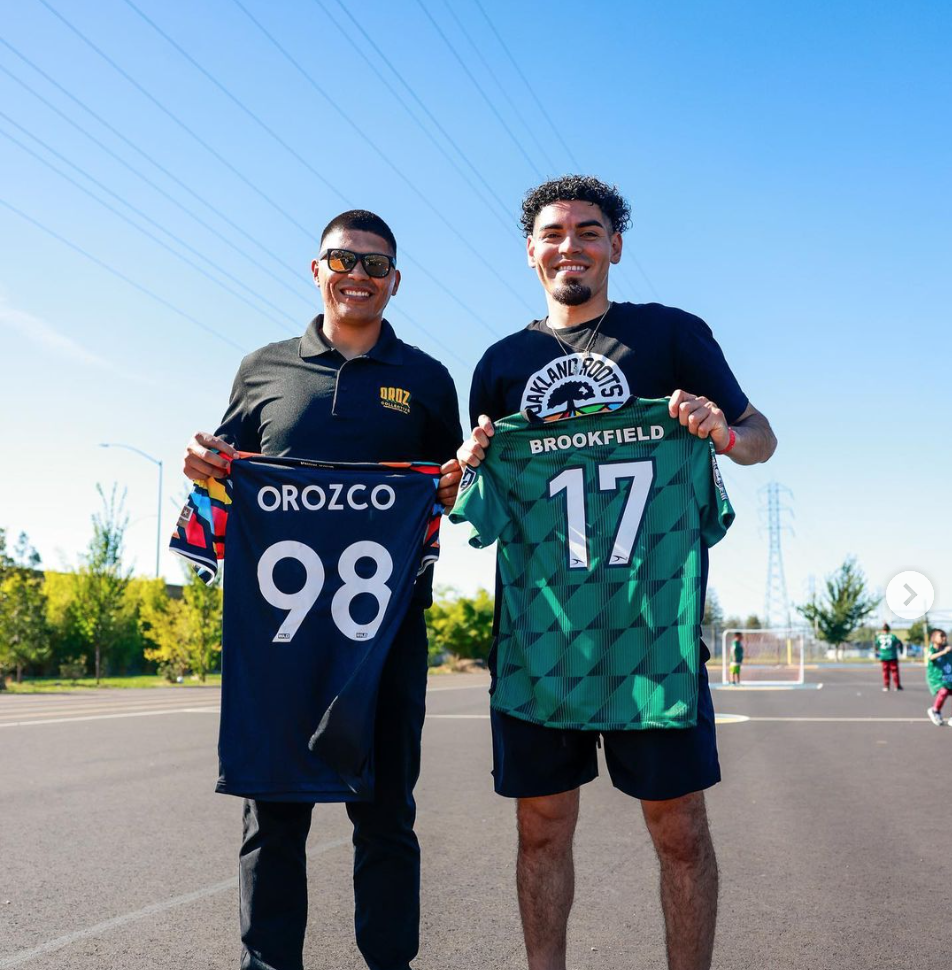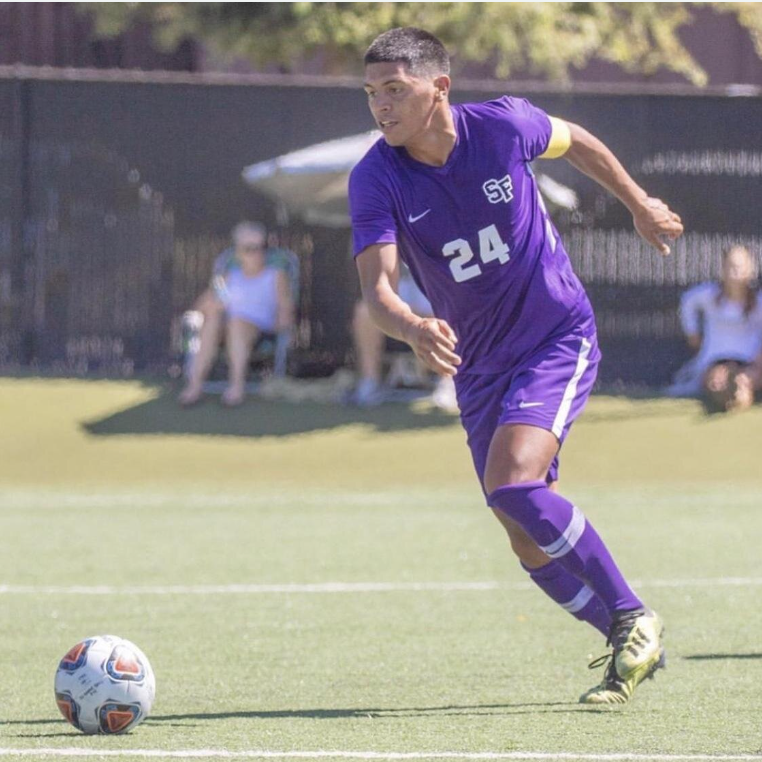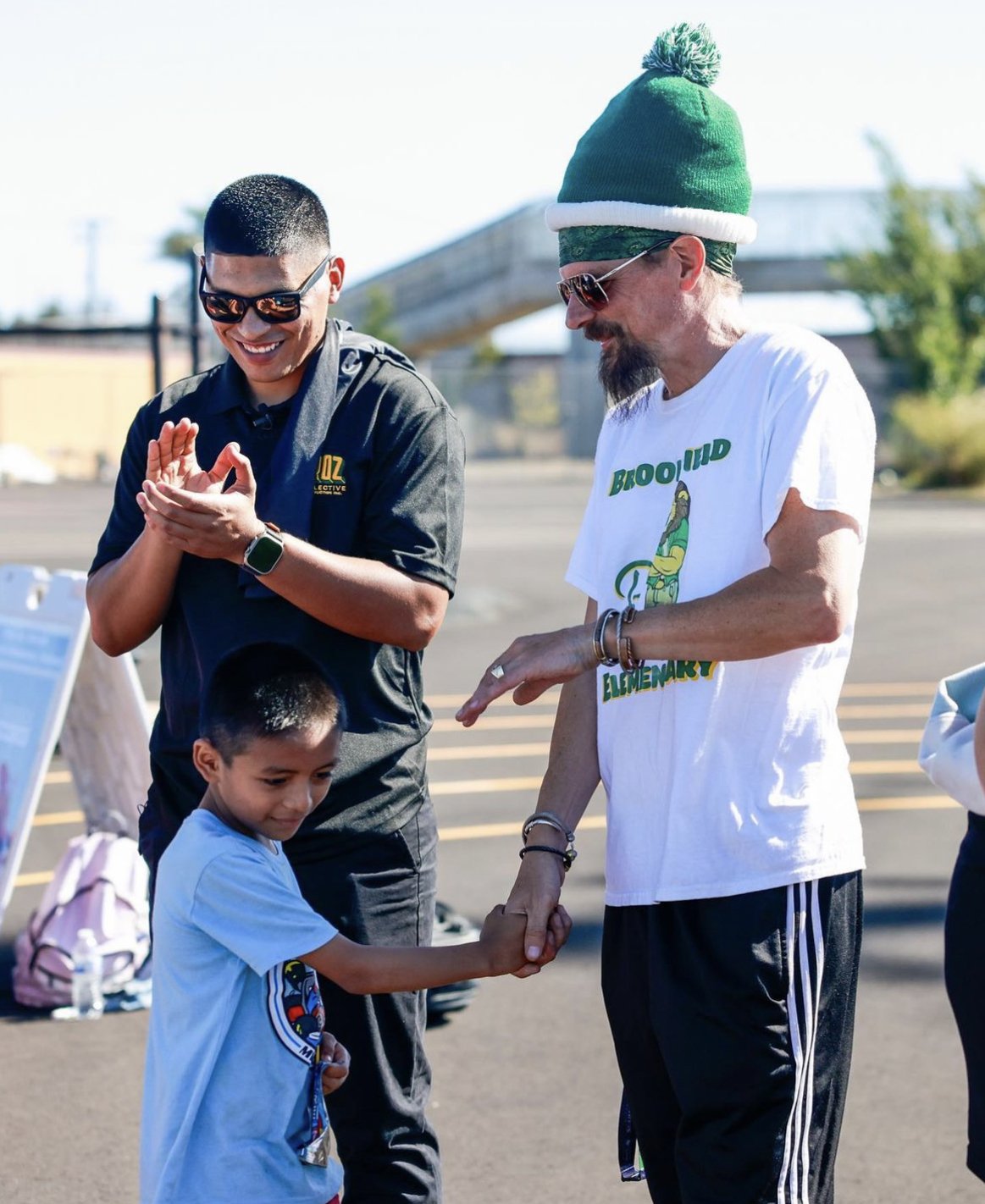Jonny Orozco
Jonny and Sebastian Orozco
“My very first experience on a team was with SCORES.”
Jonny Orozco is the eldest of seven siblings, the first in a continuous Orozco line of SCORES poet-athletes at Brookfield Elementary School in East Oakland. Two decades after Jonny first strapped on his cleats, Jonny’s youngest brother, third-grader Sebastian is thriving, learning from the same SCORES coach who guided his older brother, Brookfield teacher Corrin Haskell.
Jonny became a professional soccer player, joining the Oakland Roots in 2020. Since then, he’s hung up his professional cleats and leads a family-run construction business in Oakland, Oroz Collective.
We talked to Jonny about his time with SCORES at Brookfield and the thru line soccer has played in his educational and professional path.
Brookfield has struggled in recent years with lower enrollment but has held on with the support of the local community, the Oakland School Board, and the Oakland Roots/ Oakland Soul teams. When you were in SCORES, the school population was much bigger. What do you remember about that time?
It was alive! Those were fun times. We had so many teachers and kids – the school was packed. Having so many kids there translated to a community outside of school too, because once school let out, we still hung out together because we all lived around the same neighborhood.
My very first experience on a team was with SCORES. Outside of SCORES, there was no team; there was nothing to be part of. Being on a team teaches you to be better and to stay away from trouble. I took being on that team seriously. Coach Haskell was great. He understood the community, knew the problems, and recognized what was going on. He told us what to watch out for and what to avoid. He was both a guide and a mentor. We didn’t fully understand that at the time though; we just listened to him because he was our coach.
“After school could be a problem. That’s why SCORES was so important. ”
The school was our safe space. Violence has always been a factor in the neighborhood – and it still is - but it wasn’t an issue within the school grounds. Our principal ran the school really well. But after school could be a problem. That’s why SCORES was so important.
Being on the SCORES team taught us restraint. You had to be there at a specific time. You needed to train and prepare for the games on the weekend. I still remember the uniforms of the schools we played against. Being on the Brookfield team gave us pride in going to school and being from Brookfield, and it was a foundation for me in my path and soccer career.
And it was fun! You were playing with your best friends from school, the kids you’ve been with all day in school. That’s different from playing on a team outside of school when you see your teammates twice a week for two hours. Being on that team started developing my passion for soccer.
How was middle school and beyond after the protective bubble of Brookfield Elementary?
Middle school and high school were shaky for me. Teachers weren’t showing up, we had substitute teachers, and we weren’t learning much. I was able to stay out of trouble because I had soccer. But as a freshman in high school, I was cut from varsity because I didn’t have the grades. In middle school, I’d gotten away with it. I didn’t have the grades then either, but they still let me play. Because of that, I didn’t develop any discipline; I just went through the motions. In high school, I found out the hard way that grades matter, and that’s when I started learning.
I decided to enroll at Las Positas Community College in Livermore. But after two years, I dropped out. A lot was going on at home, and I wanted to be in a position to help more. A good work opportunity came up, and I took it. I didn’t yet know about the benefits of earning a degree because I was first generation; my parents never went to college. It just wasn’t part of their world.
But I came to realize that dropping out wasn’t helping anyone. There was more out there to aim for, So I went back to school, and by my last semester at Los Politias, I’d pulled up my GPA to a 4.0. From there I went on to earn my BA at San Francisco State.
Tell us a bit more about that realization. What exactly did you come to understand about the value of going back to school?
It took me a long time to understand education and the importance of it outside of soccer. Soccer had been what got me through everything; it was hard to put anything above it. But I ended up falling in love with education – it changed my life and opened my eyes up to what was possible. Soccer had been a vehicle to get me from point A to point B. It got me to college, but it wasn’t going to take me where I ultimately wanted to go. I needed the tools to communicate and to bring value to everything I set out to do.
And by education, I don’t just mean earning a degree, because you can earn a degree and do nothing with it. I mean being committed to learning every single day in whatever it is that you’re doing. In soccer, I wanted to be the best on the field. It’s the same thing now in business or any other job that I’m working. It’s being committed to the best version of yourself, and if that means reading books every day on business, finance, sales, advertising, and marketing, then I’m going to do it because it’s going to push me forward, push my family forward. It’s going to push people who share my background forward, and it’s going to give them a way to see beyond the limits of where they are now. You can do all that by being educated.
Being a role model for others doesn’t just feel good; it changes lives. It feels good to help people, but it feels even better to see them thrive in life, to see them push past the limits they thought they had, especially if they have limiting beliefs from growing up in this neighborhood (East Oakland). There is so much potential here. It’s figuring out how to do the hard work at the right time, in the right place.
While at SF State, you tried out for the Oakland Roots. How did that all happen?
My coach at SF State knew Oakland Root’s president at the time. This was in 2019. He emailed him and told him he had a player for him, from Oakland. The president told him there were open tryouts. So after my senior season, I went to try out. There were so many people! A little intimidating. But I got through several rounds of callbacks, and a week after the tryouts ended, I got a call from the team’s technical director. They wanted to sign me and were sending over a contract to look over. I knew I would sign it immediately. It was like a full-circle moment for me and a huge deal for me and my family – it was the dream. I was representing Oakland in my hometown.
I remember sitting at the first home game with Nana Attakora. He’s like a big brother to me and a mentor. Before he was captain of the Roots, he played MLS soccer and was on the Canadian national team. He’s been in stadiums with a lot of people. And as I was sitting with him, he looked behind us, and he said, “Jonny, I’ve never felt the kind of energy I’m feeling in this stadium.” Oakland had come out and the energy was high. People were going crazy in the stands, cheering and jumping. I remember seeing my family in the stands, my college teammates, kids I played with at SCORES from my childhood. It was a big deal for everyone. It was beautiful, an unmatched adrenaline moment, and I was so grateful to be there. I’ll never forget it.
A year into your time with the Oakland Roots, mid-Covid pandemic, you decided to leave professional soccer. Can you talk about that time?
Letting go of soccer was the hardest thing I’ve ever done because it’s an identity. Everything was soccer, soccer, soccer. But when the time came to make the transition, Nana was there for me and gave me the best help. He’s had a huge impact on who I am today. He helped me see things bigger than soccer, things that soccer won’t give you. He opened my eyes to a bigger picture. Soccer is great, but soccer ends at some point, no matter how good you are. Father Time is going to get you.
He would ask me, “What are you going to do next?” I started thinking long-term about what I wanted for my family and future family, and I realized that soccer was something I love – a real passion – but more of a selfish thing for me; it wasn’t going to pay the bills or benefit my family in the future. I was 25, and I’d come out of three years at community college. Younger and younger players were coming up, and teams wanted fresh players they could develop.
How did you respond to the idea of coming up with an exit plan?
I wasn’t mad. That’s just reality. So what am I going to do about it? Am I going to keep chasing something? Am I afraid to do something else because all I know is soccer? Or am I going to be scared, but still go out there and try? And this is where my roots come in, where I’m from. My family works hard. They came here without anything and made it happen. So I can’t be scared to do something else because I’m capable of doing something else. It was a very tough decision, but it was the right one, and I’m proud of it. There are passions and there is life, and they don’t always go hand in hand. And that’s okay. There are bigger problems out there. And today, I’m so happy because I can impact people in even more ways, and I’m working toward something that can help my family now and in the future.
I see everything as a vehicle. Soccer was a vehicle that got me through school and got me where I am today. Without soccer, I wouldn’t be here. But now construction is the vehicle that’s going to take me somewhere else. And if at some point I need to get out of that vehicle and get onto a new one, that’s completely fine. What doesn’t change is my mindset about education – it’s everything. Whatever vehicle I hop on, I’m going to learn everything I can to get to the next point. That’s what I find the most valuable, and why I’ve pushed myself so hard. Growing up, we knew about professional teams and professional athletes, but we didn’t know much about other options. Now I understand how many options there are out there, and I want to share that with the kids who’ve come after me like Nana did for me. He changed my life. I’m in business now, and a big part of that is because of him.
More than anything, it’s been the learning, and that education moves me forward. I’m talking to different people, doing things that scare me, and getting out of my comfort zone. I’m still developing as a human. I’m 28, and I’m still learning so much. It’s about setting the foundations for what’s coming next.
Check out this short Oakland Roots video about Jonny
To read more Five Questions With interviews, go here
*We made an exception and asked Jonny six questions.


